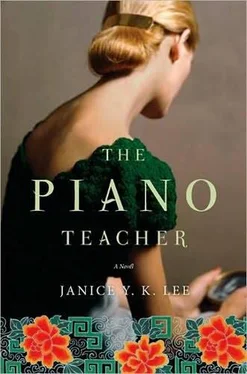He shakes her. He wants to bite her cheek, viciously, until flesh tears off and blood runs down his chin. He wants to devour her whole, until she feels the pain he has been feeling. The pain he has caused her too.
He surfaces, she recedes, he remembers the other one, the one that’s still alive. But he goes down again, into the past. Its pull is too strong.
The memory of those days. Sitting on his thin bed, helpless, outraged, angered by the endless monotony around him, the small concerns of the others-whether they were getting their fair ration, that someone had moved surreptitiously into an empty room that had not yet been allocated after the Americans had been repatriated. Ah, yes, the day that the Americans left, their government far more expedient in arranging a prisoner-of-war trade, the indescribable feeling of watching the lorries depart, filled with joyful, bedraggled people, pockets filled with messages from those remaining to loved ones around the world. They promised to get the letters out. The kinder ones had left all their blankets and extra clothes and equipment and even money, but a few took every last scrap, as if they wouldn’t throw it out the moment they got home. Funny, the mentality that springs up in such a place. And a few Americans stayed behind: the Catholic priests. They gave up their chance to return home so they could minister to the faithful remaining in the camp, regardless of nationality. Yes, there had been good people.
Another memory, from even before: the first Christmas in camp, a year or so after they had been interned. He remembered the half-dead grass in the center lawn and the dust kicked up by the children as they ran around, shouting excitedly in their ragged shorts-it had been unseasonably warm. The women had set up tables with watery lemonade and Christmas cookies donated from those still on the outside. A program with songs and recitals had been mimeographed and distributed. They had also managed to get ahold of some decorations so the straggly trees on the perimeter boasted tinsel and some garish ornaments. An old gramophone piped Christmas carols as the internees gathered around and chatted, sipping from their cups, a flask surreptitiously passed around. Bill Schott had acquired a Santa Claus costume and came out with a pillow stuffed next to his belly, much to the delight of the children, and handed out a motley but much squealed-over selection of presents: a collection of shiny buttons, a rag doll stuffed with dry grass, a Christmas collage made out of leaves. The mothers had been busy.
The Japanese soldiers watched with bemusement from the side. They had given packets of boiled sweets to the children earlier.
Regina Arbogast appeared before him suddenly, a red muffler wrapped dramatically around her neck. She still had flair.
“Will, Merry Christmas,” she said. Her husband was next to her. It was before the torture. That would happen months later. Will raised a glass to the couple.
“A year passes too quickly, doesn’t it? What a difference from last year.”
“And here we are,” said Reggie.
“You enjoying the furloughs?” Regina asked. Will’s fluidity between the inside and outside had been the source of much envy and speculation, although he always tried to bring back supplies to benefit everyone.
“ ‘Enjoy’ is a peculiar way of putting it,” he said.
“Trudy is tight with the current regime.” Regina let the statement hang in the air, a challenge.
“Is that a question or a statement?” Will asked mildly.
“How would you know anything about that, locked up in here?” Reggie said impatiently to his wife. “You presume too much, Regina.”
“Well, that’s what everyone is saying.” Regina winked. “But I suppose the less you know the better, right, Will?”
Reggie rolled his eyes and looked apologetic.
“Oh, look here,” he said. “The choir is ready to sing.” He took Regina firmly by the arm and led her away to where the older children and women were preparing to perform.
Will remembers this exchange with a sick feeling, and how it all ended up, how they were all playing at something that ended up being all too real.
Then 1945, the recurring sounds of aircraft overhead, whispers of a new kind of bomb. Something extraordinary, beyond imagination, an unthinkable death toll. A giant mushroom cloud of devastation over Japan. Snippets of information smuggled in through the daily vegetable delivery, the spinach suddenly wrapped in the English newspaper.
Guards looking sheepish, being slightly friendlier, allowed more privileges. Their rations grew larger.
Trudy still a daily thought, but now successfully muffled. None of his messages answered, no reported sightings from the people who visited other internees. It was as if she had vanished into thin air. Like her mother, he thought, and pushed that thought out of his head. In war, people die. Later, he would realize that was how a dying man would think.
And the liberation, entering a brave new world outside, still wary of the Japanese, dangerous in their loss. Some lashed out, killed while they could, but most trod the fine line between conquered and conqueror, that undefined space.
As if an old creaky machine were being cranked back into life, Hong Kong sputtered back. The buses and trams started running on their regular schedules, stores started to receive provisions, and prices slowly returned to normal. People ran into one another on the street and clutched each other, remarked on how thin everyone was, happy to have survived and to see each other, even if they hadn’t liked each other before. Practicing the normal, trying to get to mundane.
Otsubo was repatriated to Japan. Later, they heard he was hung at Sugamo Prison. There was no relief in hearing the news.
The strangeness of the first dinner party, and how everyone slipped into it cautiously at first, and then how everyone got comfortable so quickly it was unseemly. They complained about the lack of basic supplies, then the lack of good help, then how hard it was to get good wine, then everything. The amnesia of comfort, soothing, anodyne, too seductive. They were all too soon back to themselves.
How can a woman disappear? How can someone so vivid vanish?
Searching for her in the aftermath, the empty taste in his mouth, the taste of regret. Funny thing: He was always thirsty after liberation. He procured a car and drove the empty roads throughout the island-to her old flat, to Angeline’s old house, to her father’s house in Sai Kung, all vacant and vandalized, smelling musty and worse. A tour of abandoned houses. Her father dead in Macau, unknown causes during the war. Dominick also gone. Just another sad story.
Without the lightness of Trudy buoying him up, Will became morose, too serious, too dark. He lurked in odd corners of Hong Kong or stayed home, a sparse affair with one glass, one plate, a bare lightbulb. He was no longer invited anywhere. “He’s gone odd,” whispered around town. He could not define a new self without Trudy.
He sank into anonymity until he caught a glimpse of Victor and Melody getting out of their car in Causeway Bay, with their daughter. Their daughter who looked nothing like them. He remembered hearing something about Melody in the United States, a tragedy, but something that had been whispered once and then never again. He started to think. And then rang up Victor with a hard-luck story and asked for a job, knowing that the man would love to hire an Englishman for what he would consider a menial job, both men knowing there was much more to the request.
Victor loved to show him off to unknowing business associates, particularly those just arrived from Europe or America. Will would pull the car around and get out to open the door. Victor’s guests would widen their eyes and step into the car, visibly impressed. An Englishman working as a driver, even for a family such as the Chens, was almost unheard of, especially someone like him, who’d been out and about in society before the war. Still, most were embroiled in their own concerns and many had emerged much changed from the war-the Dutch banker who exited Stanley a schizophrenic and now lived in an alley building in Sheung Wan and came out to beg with a rattan basket, his blond hair matted and dark; or the Miller girl who had been engaged to one of the Hos, the shipping family, but came out of the camp too used, and now lived in Mong Kok and was rumored to be a bar hostess. Will was just another casualty of war, and not the worst off of them. People talked at first, but then it became just another quirky fact of Hong Kong life.
Читать дальше












